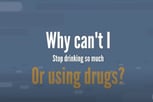When it comes to recovery, there are many levels of treatment. The highest level of care is residential, where the patient is required to be under surveillance twenty four hours. This stage in some addictions can be known as detoxification. The next stage is partial hospitalization, where the patient is only required to participate in care for four to eight hours a day, usually five days a week depending on the program. The next stage is intensive outpatient, where patients meet for groups and therapy only two to three days out of the week. Finally, the last stage is outpatient, where the patient only meets with an individual therapist and assigned groups once a week. One of the most crucial stages of transition is the one from intensive outpatient (IOP) to outpatient (OP).
Due to the extra freedom that’s allowed in OP, the transition from IOP to OP is a crucial stage. The newfound freedom may seem overwhelming at times and, understandably, there is a large fear of relapsing. That is why Dr. Arturo C. Taca Jr., Medical Director at IN Synergy Treatment Program advises that those in outpatient treatment options should still be “supervised by appropriately trained professionals.”
Having a team of professionals by your side to provide care and support when you need it is essential for a seamless transition. The following are all the people who I had on my team when I left my intensive outpatient to start outpatient, and who you should also consider having on yours as you gain more independence in your recovery journey.
1. Therapist
Finding therapists can be tricky. Searching for one that is covered by insurance with a decent copay, accepts the form of payment used, and within a preferred mile range can seem impossible. Accomplishing this before release from IOP is essential because without a main therapist, recovery can easily be hampered or be put at a standstill.
2. Psychiatrist
Psychiatrists tend to be booked months in advance, so it is highly recommended to look for one months before leaving IOP. This way the transition can be seamless from seeing the treatment psychiatrist to the personal one. Medication is a very helpful additive to treatment and should be continued after release. Keep in mind thought that medication may have some side effects which should be discussed with a professional psychiatrist to ensure there is no immediate physical danger.
3. Accountability Partner
Another good idea is to set up a buddy relationship with a friend or family member for accountability within the first few months after release. This is not done out of the belief that you will definitely relapse after release, but because you want to safeguard yourself in the instance that you have a hard day or a stressful occurrence. You’ll want to have a “buddy” to rely upon for additional support if and when that happens. Having a go-to friend or family member phone set to speed dial also makes it easier to open up about how you’re feeling about yourself and your progress in recovery.
4. A Group
After release, your emotions can get very overwhelming and scary. That is why it is essential to have lots of support from people who are experiencing or have experienced these situations by your side. Feeling alone is the last thing you need during this crucial time. By attending groups, you have a higher chance of seeing your recovery through because everyone there has the same goal of getting better in mind.
An easy, smooth recovery is possible if done correctly. With the right team and support around an individual, the chances for a successful recovery increase exponentially. Having a strong network around you during this time can make this possible.








